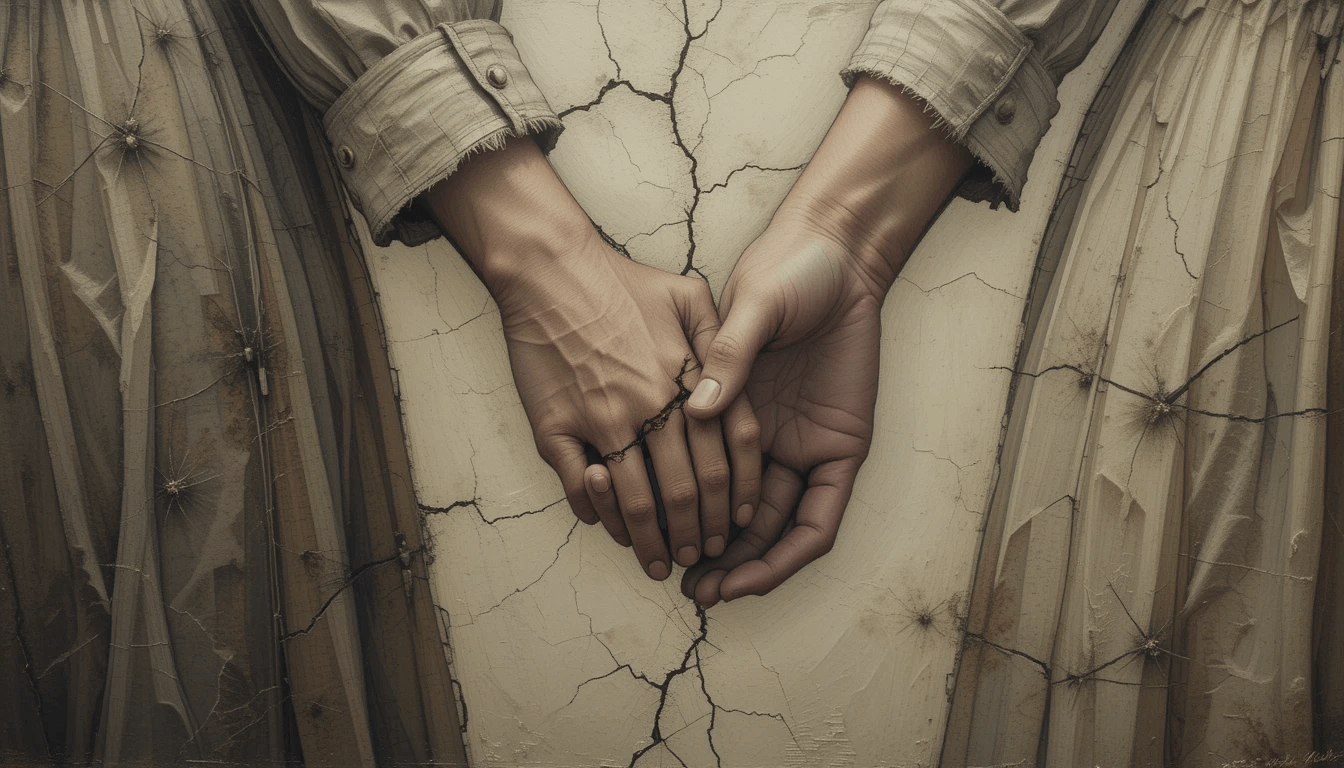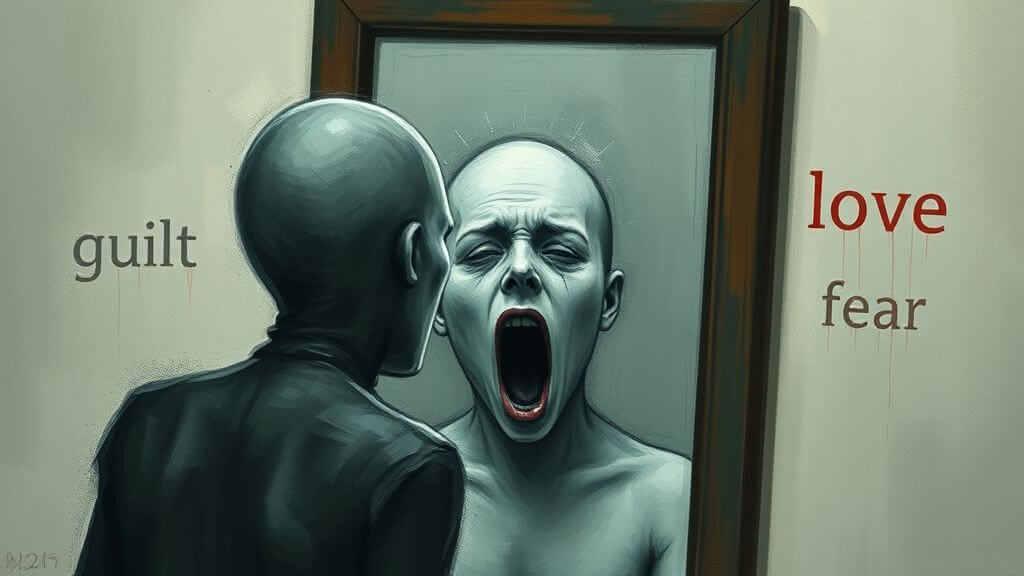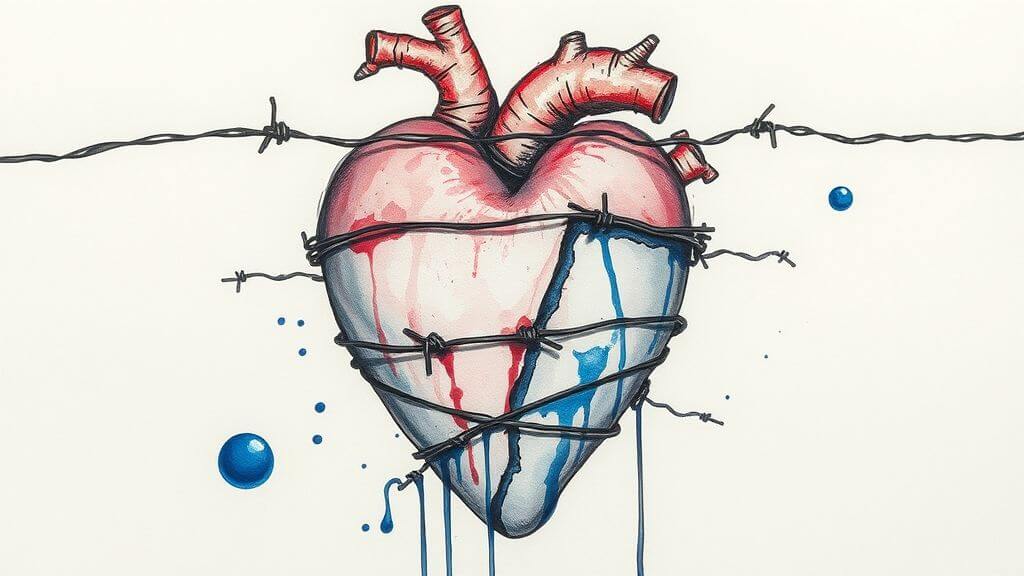
I didn’t recognize it was happening to me until that Tuesday afternoon in April. The bruise on my wrist had faded to a sickly yellow, and I was busy explaining to my coworker how clumsy I’d been with the car door again. The look in her eyes – part pity, part disbelief – made my stomach twist. That’s when I knew. She didn’t buy it. And honestly? I was starting to not buy it either.
Abusive relationships don’t announce themselves. They creep in slow, like fog, until you can’t see three feet in front of you and you’ve forgotten what clear skies even look like.
I’m writing this from the other side now. Three years, eight months, and twenty-two days free. But I remember. God, do I remember.
The Invisible Handcuffs
Lemme tell you something nobody talks about – the bizarre comfort of staying. Sounds messed up, right? But when you’ve built your world around walking on eggshells, there’s a certain skill to it. A pride, even. You get GOOD at predicting moods, at defusing bombs before they explode. You become a relationship ninja, expertly navigating the minefield of their emotions.
And eventually? That becomes your normal. My mom used to call me weekly. “Just leave him,” she’d say, like I was choosing where to eat dinner. “Just GO.”
As if I hadn’t thought of that. But see, here’s what people on the outside don’t get about being trapped in an abusive relationship – leaving isn’t just hard. Sometimes it feels impossible. And not in the dramatic, movie-of-the-week way. In the mundane, everyday, “but where would I even go?” way.
1 The Voice in Your Head Becomes Their Voice
You know those cruel things they say to you in private? After a while, you start saying them to yourself first. It’s like… preventative self-destruction. “You’re so stupid.” “Nobody else would put up with you.” “You’re lucky I even bother with you.”
The first time he said those things, I cried for hours. By the hundredth time, I was nodding along. Agreeing. Thankful, even, that someone would “tolerate” me. Bruh. When I think about that now? I wanna go back in time and shake myself so hard. But I get it. I was drowning, and drowning people can’t see clearly.
2 The Question Everyone Side-Eyes You With
So why DO people stay in abusive relationships?
That question follows survivors around like a bad smell. It’s what your friends whisper when they think you can’t hear. What your family asks with that mix of judgment and concern that makes you wanna crawl under a rock.
Here’s the messy truth – it’s never just ONE reason. It’s a tangled mess of:
- Fear (and not just of getting hit again)
- Financial shit (try leaving when your credit’s destroyed and your name isn’t on the lease)
- Kids (the most complicated reason of all)
- That twisted hope that THIS time they really mean it when they say they’ll change
- The absolute mindfuck that is trauma bonding (Google it, seriously)
For me? It was all of that, plus the crushing belief that maybe, just maybe, this WAS as good as it got for someone like me.
3 Acting Class: Advanced Level
You get scary good at pretending everything’s fine. Oscar-worthy performances at family dinners. Golden Globe material on social media. “He’s just stressed from work!” “We’re going through a rough patch.” “I’m just tired lately.”
You perfect the art of the fake smile. The light laugh when someone gets too close to the truth. I once gave an entire wedding toast with a sprained wrist hidden under a too-long sleeve in July heat because “I fell” the night before. People believed me because they wanted to. Because the truth was too uncomfortable.

4 Taking the Blame Is Easier Than Taking Action
Lowkey, the most twisted part is how you start to think it’s your fault if I hadn’t talked to that guy at the bar. If I had just answered my phone faster. If dinner had been ready on time. If I weren’t so “emotional” or “difficult” or whatever the flavor-of-the-day criticism was. It’s messed-up psychology, but blaming yourself gives you the illusion of control. You just need to be better.
Wrong. So damn wrong. But that’s the trap.
5 When Something Finally Clicks
For everyone, there’s a moment. Sometimes it’s dramatic – a hospital visit, a threat that crosses a final line. Sometimes it’s quiet – catching your reflection and not recognizing who’s looking back.
For me, it was watching my niece’s birthday party. She was turning seven, and spinning in circles in her princess dress, completely free. I realized I couldn’t remember when was the last time I’d felt that unselfconscious, that safe in my own skin. And something just… broke open in me.
Why do people stay in an abusive relationship? Because leaving feels impossible until suddenly, it’s the only possible thing left to do.

6 The Loneliest Place on Earth
No abuser worth their salt lets you keep your support system intact. They chip away at those connections – a critical comment about your best friend here, a fight picked before family dinner there, moving you “for a fresh start” someplace where you don’t know anyone. Before you know it, your world shrinks to just them. Their moods. Their needs. Their version of reality.
My ex used to check my phone while I showered. He’d text my friends FROM my phone, declining invitations or sending slightly-off responses that eventually made them stop reaching out. A year in, I had no one left who wasn’t filtered through him first.
That isolation? It’s not an accident. It’s strategy.
7 “I Wouldn’t Know How to Be Loved Properly Anyway”
After enough time being treated like garbage, you start to think maybe that’s what you are. Garbage. I remember watching normal couples at restaurants, confused by how they spoke to each other. The basic respect. The ease. It looked like a foreign language.
I’d think, “Even if I could leave, I’d probably mess up a healthy relationship anyway. At least with him, I know the rules, even if they change daily.”
That’s what abusive relationships do – they convince you that the abnormal is normal, and that you’re unequipped for anything better.

8 Looking Through the Window at Normal Life
Social media becomes torture. Everyone posting their “perfect” relationships while you’re hiding bruises or crying in bathroom stalls. You scroll through vacation photos and anniversary tributes thinking, “What’s wrong with ME that I don’t get that?”
I had a coworker whose husband brought her coffee every morning. Just… because. No strings attached. No keeping score. No punishment if she didn’t appreciate it enough. I used to watch this simple interaction with complete bewilderment, like I was observing aliens.
The gap between what you have and what you see others having becomes another wound.
9 The Cycle That Makes You Crazy
The worst part? The good times. The sweet, perfect moments that keep you hooked like a junkie chasing that first high. After the explosions come the apologies. The tears. The promises. The gifts. The best sex. The intensity of making up that makes you feel like maybe it was all worth it, just for THIS connection.
And for a while, days, weeks if you’re lucky – things ARE better. They’re attentive. Loving. Until they’re not.
That cycle – tension, explosion, honeymoon, repeat – it’s biochemically addictive. I’m not making that up. Your brain literally gets hooked on the chemical rollercoaster. Look up trauma bonding if you don’t believe me.

10 When Love Becomes Poison
There’s a special kind of mindfuck that happens when the person who knows exactly how to make you feel loved also knows exactly how to destroy you. They know your insecurities because you trusted them with that information. They know what hurts worst because you’ve been vulnerable with them.
My ex knew I had body image issues from high school. Guess what became his favorite target when he was angry? The surgical precision of his cruelty wasn’t an accident. The betrayal cuts so deep because no stranger could ever hurt you this efficiently. Only someone who truly knows you has that map to your soul.
11 Who Even Am I Anymore?
When I walked out for the last time, I stood frozen in front of my closet. My hands hovered over shirts and jeans, but nothing felt like ‘me.’ For years, I’d chosen outfits based on what wouldn’t set them off—neutral colors, nothing too tight or loose, nothing that might draw attention. Now, with freedom staring back at me, I couldn’t remember what I’d ever loved wearing in the first place.
I didn’t know what music I enjoyed. What foods did I prefer? What I like to do for fun. My personality had been so bent around his preferences that I’d lost the shape of myself. That’s the quiet devastation of an abusive relationship that people don’t talk about enough. The identity theft. The gradual erasure of YOU.
12 Finding Solid Ground Again
Healing doesn’t follow a map. It’s more like stumbling through a storm—some moments you stand tall, feeling the weight lift, and others you’re on your knees gasping for air. You’ll ache for their laugh one hour, then burn with rage the next. The whiplash of longing and disgust? That’s not relapse—it’s the work of untangling yourself from what was once your whole world.
What helped me:
- A therapist who specialized in trauma. Not all therapy is created equal, and trauma needs specific approaches.
- Journaling the truth. Writing down what really happened helps counter the gaslighting that makes you doubt your own memories.
- Choosing one person to be completely honest with. Having someone witness your reality without judgment is healing beyond words.
- Small decisions. Choosing my own dinner, my own Netflix show, my own bedtime. Building back autonomy through tiny choices.
- Forgiving myself. The hardest part, honestly. Forgiving myself for staying, for loving someone who hurt me, for all of it.
Real Talk – You’re Stronger Than You Know
If you’re reading this and nodding along, I see you. I was you. Sometimes I still am you on the hard days. But I need you to hear this: leaving is possible. Healing is possible. A life where love doesn’t hurt is absolutely possible.
“I am not what happened to me. I am what I choose to become.” Someone told me that in a support group, and I thought it was some cheesy Pinterest quote. But damn if it didn’t become my lifeline on the darkest days. Your abuser convinced you that you’re stuck, that you’re nothing without them, that you deserve the treatment you’re getting. Every single bit of that is a lie.
If you’re in it right now, I’m not gonna hit you with some toxic positivity about how everything happens for a reason or whatever. This shouldn’t be happening to you. Period. But I will tell you that you’re surviving something incredibly difficult, and that takes a strength most people will never understand. And if you’ve left? Man, I’m so proud of you. Even if you went back a few times before it stuck. You did the hardest thing.
If you’ve made it this far in this messy, rambling post, know that you’re not alone. Whether you’re still in it, just out, or years into healing – there are so many of us who get it. Who won’t ask “why did you stay?” but will instead say “I understand.”
You deserve peace. You deserve safety. You deserve love that builds you up instead of breaking you down.
And yeah, that sounds like greeting card bullshit. But it’s also true.
Some Questions People Ask Me A Lot
“What’s the first step to getting out?”
Safety first. Always. Don’t announce you’re leaving. Don’t threaten to leave during a fight. Make a quiet plan. Save money if you can. Get important documents somewhere safe. Tell someone you trust. And reach out to professionals who can help you make a safety plan that makes sense for YOUR specific situation.
🌍 Need Help ?
If you’re in an abusive relationship, it’s important to reach out for help—no matter where you live. Every country has its own departments, hotlines, or shelters dedicated to protecting people from domestic violence.
👉 Here’s how to find help near you:
The National Domestic Violence Hotline is 1-800-799-7233. They don’t judge. They just help.
Search on Google: Type “Domestic Violence Helpline + [Your Country]”
Example: “Domestic Violence Helpline UK” or “Women’s shelter Canada”
Visit your local police station or women’s protection cell: In many countries, police departments have dedicated domestic abuse units or Women and Child Protection Cells that can help right away.
Hospitals and community clinics: They can connect you with social workers and safe houses if you’re in danger.
Ask for help anonymously: If you’re scared, use a friend’s phone or a public device to look up local services. Help is still help—even if it’s quiet.
Disclaimer: This post is for informational and emotional support purposes only. Every relationship is unique, and this is not professional legal, medical, or mental health advice. Read our full disclaimer.
Affiliate Disclosure: Some links in this post may be affiliate links. If you make a purchase through them, I may earn a small commission at no extra cost to you. Learn more here.